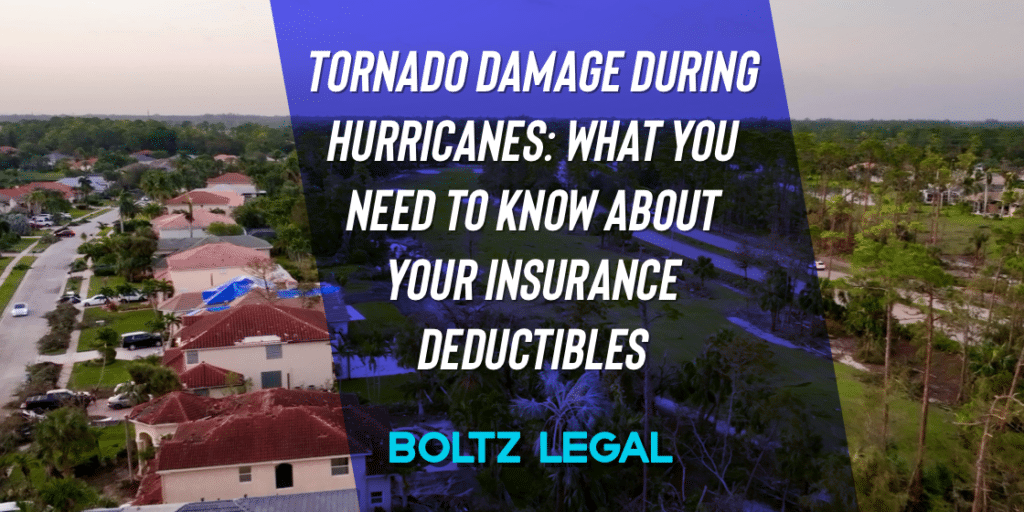As hurricane season peaks, Florida homeowners brace themselves for the dual threats posed by hurricanes and tornadoes. While hurricanes are expected, the tornadoes that often accompany them bring a unique set of challenges for property owners—particularly when it comes to understanding which insurance deductible applies. In this article, we’ll break down the key elements of hurricane deductibles, windstorm deductibles, and how to handle tornado damage during a hurricane.
Understanding Hurricane Deductibles
Hurricane deductibles are a common feature of insurance policies in hurricane-prone areas like Florida, Louisiana, and Texas. These deductibles were first introduced after the massive payouts caused by Hurricane Andrew in 1992, as a way for insurance companies to manage the high cost of wind-related damage. Typically, hurricane deductibles are calculated as a percentage of your home’s insured value, meaning they can be much higher than your standard deductible.
For example, if your home is insured for $300,000 and your hurricane deductible is 5%, you would need to pay $15,000 out of pocket before your insurance kicks in for any hurricane-related damage, including tornadoes triggered by the hurricane’s outer bands.
How Tornadoes Are Classified in Hurricane Events
Tornadoes frequently occur during hurricanes, particularly in the outerbands far from the hurricane’s eye. These tornadoes can cause significant damage, raising questions about which deductible applies—your hurricane deductible or the standard windstormdeductible.
Most Floridainsurancepolicies define hurricane-related damage to include not just the hurricane itself but also associated weather events, like tornadoes and cyclones. According to these definitions, even if a tornado occurs hundreds of miles from the hurricane’s path, the hurricane deductible may still apply because the tornado is considered part of the overall hurricanewindstorm.
Windstorm and Named Storm Deductibles
It’s important to differentiate between windstormdeductibles and namedstormdeductibles. Some policies may apply a windstorm deductible for general wind damage, whether it’s caused by a hurricane, tornado, or other storm systems. However, many policies in Florida and other coastal states specify that a hurricanedeductible applies when a storm has been declared a hurricane by the National Hurricane Center (NHC), and this deductible covers all types of wind damage caused by the hurricane, including tornadoes.
Tornado Damage: A Growing Concern
During Hurricane Milton, 38 tornadoes were reported across Florida, causing extensive property damage well beyond the hurricane-force wind zone. Homeowners in areas like Palm Beach Gardens, which were spared the worst of the hurricane, still saw significant tornadodamage—including an industrial dumpster landing on the roof of a residential home.
Because these tornadoes were part of the hurricane system, homeowners were often surprised to find that their hurricanedeductible applied instead of their standard deductible. This confusion underscores the importance of thoroughly reviewing your insurance policy to understand how tornadoes and other wind-related events are categorized.
Key Takeaways for Property Owners
- Review Your Policy: Ensure you understand the terms of your coverage, including what events trigger your hurricanedeductible versus your windstormdeductible.
- Know the Definitions: Check how your policy defines terms like “hurricane windstorm,” “named storm,” and “tornado damage.” These definitions determine which deductible applies in cases of tornadodamage during hurricanes.
- Document Everything: After a storm, make sure to document any damage as thoroughly as possible, especially if it’s related to tornadoes. Wind–relateddamage may not always be visible right away, so getting an expert inspection is crucial.
- Understand Deductibles: In hurricane-prone states like Florida, you may face higher deductibles for hurricane-related damage, including tornadoes. Policies often include percentage deductibles, meaning your out-of-pocket costs could be substantial before your coverage kicks in.
Navigating the intricacies of insurance deductibles can be overwhelming, especially when hurricanes and tornadoes collide. Understanding the relationship between these two events and your insurance coverage is vital for ensuring you’re fully protected. If you’re unsure about the details of your policy, don’t hesitate to consult with an insurance expert or legal professional who can help clarify which deductible applies in the event of tornado damage during a hurricane.
Today’s Insight:
“Success is not final, failure is not fatal: It is the courage to continue that counts.”

